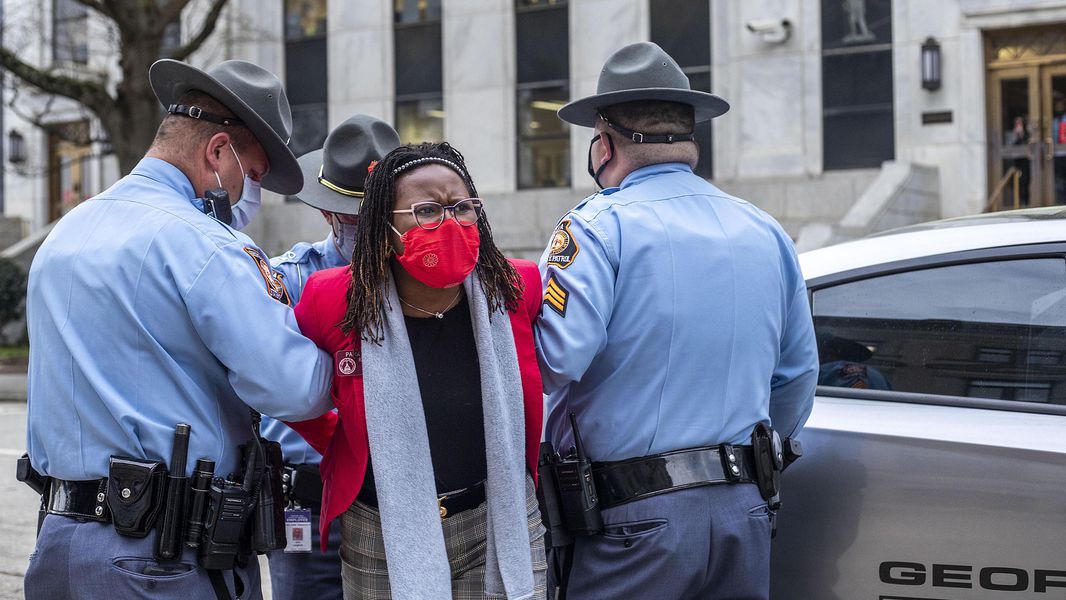
An elected Georgia state official is facing two felony charges for knocking on a door.
“Why are you arresting her?” This Facebook Live video from @TWareStevens shows the moment authorities detained state Rep. Park Cannon as @GovKemp was behind those doors signing elections restrictions into law. #gapol pic.twitter.com/U1xMJ6tZrY
— Greg Bluestein (@bluestein) March 25, 2021
From the Atlanta Journal-Constitution:
The arrest of state Rep. Park Cannon — who faces two felony charges — far overshadowed the victory lap that Kemp and other Republicans hoped to take with the signing Thursday of Senate Bill 202, legislation that imposed new ID requirements, limited drop boxes and instituted other restrictions.
The image of Cannon, an Atlanta Democrat, being forcibly dragged from the statehouse lobby was hard to watch and the arrest could be legally questionable, since state law protects sitting lawmakers from arrest during a session except for charges of treason, felonies or breach of the peace.
The Hill reported that Rep. Cannon was charged with “obstruction of law enforcement, as well as ‘Preventing or disrupting General Assembly sessions or other meetings of members.’” She had bruises on her arms after the arrest. See more details of the arrest and charges at CNN.
Georgia Governor Brian Kemp must be proud.

Georgia Governor Brian Kemp, possibly.
Yes, I’m angry.
Let’s back up and look at what happened. Ed Kilgore writes at New York magazine,
Republican Governor Brian Kemp on Thursday signed into law a measure passed by Georgia’s Republican-controlled legislature to restrict voting rights in reaction to Democratic gains there last year. While it’s not the “Jim Crow 2.0” critics feared — and that earlier versions threatened — the new law shows a determined effort by Republicans to restrict voting in order to claw back power.
The bill imposed a new ID requirement on those wishing to vote by mail and tightened deadlines on mail ballots. It also restricted mail ballot drop boxes, banned provisional ballots for votes cast in the wrong precinct, and perhaps most ominously, allowed for state takeover of election administration from county election boards if it deems such interventions necessary.
The legislation also overhauled rules governing Georgia’s unique general election runoffs, which produced two Democratic wins in January that gave Democrats control of the U.S. Senate. Going forward runoffs will occur four weeks after the general election, with very limited time provided for the early voting on which Democrats generally, and minority voters specifically, tend to rely. The new law also eliminates special election non-partisan “jungle primaries” like the one held last November to choose someone to fulfill the rest of the term of U.S. Senator Johnny Isakson, who resigned for health reasons. Now parties will hold primaries before a general special election to fill vacancies. The idea may be to give Republicans more time to recover from the kind of intra-party fisticuffs engaged in by appointed Senator Kelly Loeffler and right-wing challenger Doug Collins before Loeffler’s runoff loss to Raphael Warnock.
As soon as the bill was passed yesterday, Kemp and six white men gathered in his office behind a closed door for the signing ceremony. Rep Cannon knocked on the door to be admitted to the ceremony and was arrested.
See also Five Big Takeaways on Georgia’s New Election Law. The most alarming part is this:
The law allows the State Elections Board to temporarily suspend county elections directors and boards that it deems in need of review. At the same time, the secretary of state will be removed as chair of the state board and will be made an ex-officio, nonvoting member.
Those provisions have raised particular concerns among Democrats, who say that it will give far-reaching control over state and local elections procedures to partisan legislators and allow them to determine, for example, which ballots to count.
So next time, say, DeKalb County’s votes are just way too Democratic, Republicans in the legislature can just swoopp in and change that.
The Georgia House of Representatives passed a major power grab on Thursday on a party-line vote that would remove Raffensperger as the chair and a voting member of the state election board, which oversees the certification of elections and voting rules, and instead allow the GOP-controlled legislature to appoint a majority of the board’s members, including the chair. “This is extraordinarily dangerous,” says Sara Tindall Ghazal, the former election protection director of the Georgia Democratic Party. “When you’re appointing the majority of the body that you’re responsible to, it’s self-dealing.”
The state board, in turn, would have extraordinary power under the bill to take over county election boards it views as underperforming, raising the possibility that elections officials appointed by and beholden to the heavily gerrymandered Republican legislature could take over election operations in Democratic strongholds like Atlanta’s Fulton County, where Trump and his allies spread conspiracy theories about “suitcases” of ballots being counted by election officials in November after GOP poll monitors had left.
“It will make what we all lived through in 2020 child’s play,” Lauren Groh-Wargo, head of Fair Fight Action, a voting rights group started by Stacey Abrams, said on a call with reporters this week. “Donald Trump won’t have to strong-arm our election administrators. The most radical fringes of the Republican Party sitting in the state legislature will be able to wipe out boards of elections, challenge voters because they don’t have the right name according to them or they don’t look the way they think they should look. This is Jim Crow 2.0.”
A coalition of voter’s rights groups have already filed a suit challenging the law.
Voting rights groups on Thursday night filed a lawsuit just hours after Georgia enacted a Republican-crafted law that gives state lawmakers more power over elections and imposes a raft of new voting restrictions.
The 35-page complaint filed in federal court in Atlanta alleges that minority voters will be hit especially hard by the new legislation, which plaintiffs say illegally suppresses voters’ rights in violation of constitutional protections and the 1965 Voting Rights Act. …
… The lawsuit was filed by voting rights groups New Georgia Project, Black Voters Matter Fund and Rise, Inc., and is backed by Democratic lawyer Marc Elias.
See also Greg Sargent, A scorching reply to Georgia’s vile new voting law unmasks a big GOP lie.
